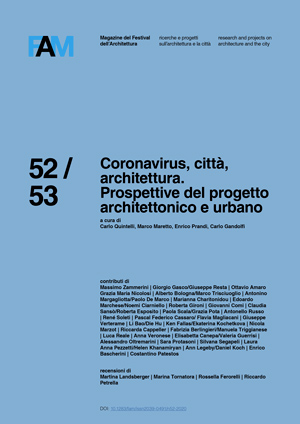Da ‘Parasite’ alla pandemia. Come le città coreane possono aprire la via verso una urbanistica globale post-Covid
Pubblicato 2020-12-11
Parole chiave
- Covid-19,
- Corea del Sud,
- K-urbanism,
- Società della stanchezza
Come citare
Abstract
La natura non negozia, e la pandemia da Covid-19 lo ha dimostrato innescando un esperimento in tempo reale su una civiltà auto-confinata che cerca di reagire negli ambienti più densamente abitati: le città. In poche settimane, la Corea del Sud è riuscita a spostare l’attenzione del mondo dal suo film satirico “Parasite”, che tratta la disuguaglianza sociale nelle città e l’isolamento dell’uomo moderno, verso la sua capacità di rallentare la diffusione del virus, nonostante inizialmente fosse uno dei territori maggiormente colpiti. Tuttavia, la resilienza delle città coreane non si è basata solo su un sistema trace-test-treat (tracciamento-test-trattamento), ma su un’emergente visione urbanistica basata sulla tecnologia ed incentrata sull’uomo. Questo studio si propone di presentare le esperienze delle città sudcoreane che hanno permesso al paese di superare la crisi attuale e di analizzare come queste possano essere d’esempio per altre città nel mondo post-COVID.
Riferimenti bibliografici
- AGAMBEN G. (2020) – “Giorgio Agamben on coronavirus: “The enemy is not outside, it is within us.” [online] Available at: <http://bookhaven.stanford.edu/2020/03/giorgio-agamben-on-coronavirus-the-enemy-is-not-outside-it-is-within-us/> [last access 24 July 2020]
- CAMPBELL M. (2005) –“What tuberculosis did for modernism: the influence of a curative environment on modernist design and architecture”. Medical history, 49 (4), 463–488.
- CARRION J. (2020) – “La biología está acelerando la digitalización del mundo”. The New York Times. [online] Available at: <https://www.nytimes.com/es/2020/03/29/espanol/opinion/coronavirus-revolucion-digital.html> [last access 24 July 2020]
- Economic Policies, H2 2020 (2020) – Ministry of Economics and Finance, South Korea. [online] Available at: <https://english.moef.go.kr/pc/selectTbPressCenterDtl.do?boardCd=N0001&seq=4913> [last access 24 July 2020]
- Flattening the curve on COVID-19: How Korea responded to a pandemic using ICT (2020) – The Government of Korea. [online] Available at:< http://www.undp.org/content/seoul_policy_center/en/home/presscenter/articles/2019/flattening-the-curve-on-covid-19.html>[last access 24 July 2020]
- GEHL J. (2010). - Cities for people. Island Press, Washington, DC.
- GREENFIELD A. (2013) - Against the smart city: The city is here for you to use. NY: Do projects, New York.
- HAN B. (2015) - The Burnout Society. Stanford University Press, Stanford.
- HAGEN H. (2019) – “The Black List Interview: Bong Joon-ho on Parasite”. [online] Available at: < https://blog.blcklst.com/the-black-list-interview-bong-joon-ho-on-parasite-5fd0cb0baa12>[last access 24 July 2020]
- HAN B. (2017) - The Scent of Time: A Philosophical Essay on the Art of Lingering. Wiley, New Jersey.
- HARARI Y. N. (2020) – “Yuval Noah Harari: the world after coronavirus”. Financial Times. [online] Available at: <https://www.ft.com/content/19d90308-6858-11ea-a3c9-1fe6fedcca75> [last access 24 July 2020]
- HERNANDEZ M. e SCARR S. e SHARMA M. (2020) – “The Korean clusters How coronavirus cases exploded in South Korean churches and hospitals”. [online] Available at:<https://graphics.reuters.com/CHINA-HEALTH-SOUTHKOREA-CLUSTERS/0100B5G33SB/index.html>[last access 24 July 2020]
- LEE K. e JUNG K. (2019) – “Factors Influencing the Response to Infectious Diseases: Focusing on the Case of SARS and MERS in South Korea”. International Journal of Environmental Research and Public Health, 16(8):1432.
- LEE H. (2019) – “A Study on the Characteristics of New Towns and the Redevelopment of Project-Canceled Areas: A Case Study of Seoul, South Korea”. Sustainability, 11(20), 1-18.
- KIM Y. (2013) – A Primer on Korean Planning and Policy. Regional Development. Korea Research Institute for Human Settlements (KRIHS), Seoul.
- ZIZEK S. (2020) – “Coronavirus is ‘Kill Bill’-esque blow to capitalism and could lead to reinvention of communism”. [online] Available at: <https://www.rt.com/op-ed/481831-coronavirus-kill-bill-capitalism-communism/> [last access 24 July 2020]

